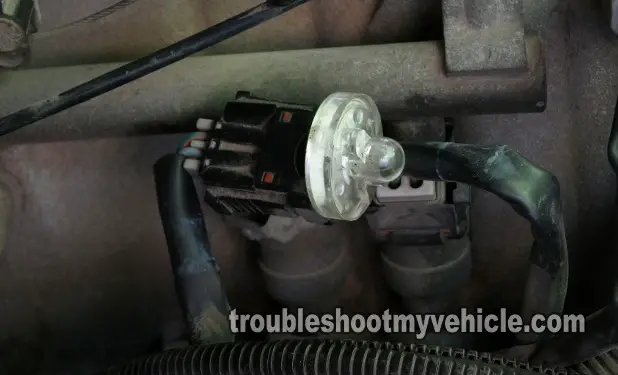Fuel Injector Diagnostic Strategy
In this section I want to share with you the fastest way I've found to pinpoint the fuel injector that's bad.
Thankfully, there is a logical step-by-step way of finding out if the fuel injector (or anything else) is the one causing your engine to miss (misfire, idle rough, etc.). The best part of all, is that you don't need to spend ‘an arm and a leg’ on expensive diagnostic equipment!
These are the steps I take:
- 1
Find the ‘dead’ cylinder first.
This usually involves hooking up a scan tool and checking for misfire codes.
Unfortunately, the PCM doesn't always set a specific bad fuel injector code, but when a fuel injector does go bad, you WILL see a misfire code.
If you don't have a misfire code, then the next step is to do a manual cylinder balance test. This involves unplugging one fuel injector at a time (while the engine is running) and seeing if unplugging the injector DOES NOT cause a drop in engine RPM's.- If the cylinder is working (not ‘dead’), then unplugging its fuel injector will cause a noticeable drop in the engine's RPMs.
- If the cylinder is ‘dead’, then unplugging its fuel injector will NOT cause any engine RPM drop.
- 2
Make sure the ‘dead’ cylinder is getting spark.
The next step is to check for spark and thus eliminate the ignition system as the source of the problem.
What I'm looking for here is to confirm that the spark plug is getting spark and I do this by connecting a spark tester on the spark plug wire feeding the ‘dead’ and having a helper crank the engine while I observe the spark tester (see image 1 of 2 in the image viewer above).
If I don't get spark, then I've found the source of the misfire (rough idle, ‘dead’ cylinder, etc.) and now I know I need to check the ignition system further and diagnose/replace spark plug wires, distributor cap/rotor, etc.
If I get spark, then I continue on to the next step. - 3
Remove the spark plug(s) and visually inspect them.
What I'm checking for are for cracks and/or carbon tracks and/or oil filling up the spark plug Well.
If the spark plugs check out fine, I move on to the next test step. - 4
Perform an engine compression test.
Testing the cylinder's compression is so often overlooked as a cause of a misfire.
What I'm looking for is to see if any one cylinder is too worn out. If it's too worn out, it will always have 15% lower compression that the highest compression reading of the six (3.9L) or eight (5.2L, 5.9L).
If the ‘dead’ cylinder's compression values are within spec (in relation to the others and the 15% rule of thumb), I then move on to testing the fuel injectors and/or swapping them. - 5
Check fuel injector resistance with a multimeter.
I usually leave this test step till the very end (but you don't have to). - 6
Perform a Noid Light test on the fuel injector's connector.
This is a very important test, because it checks to see if the fuel injector is getting power and is being activated by the PCM (see image 2 of 2 in the image viewer above).
If the Noid Light flashes ON and OFF, then the fuel injector is getting both power and an activation signal.
If the Noid Light DOES NOT flash ON and OFF, then power or the activation signal is missing. - 7
Swap the fuel injector.
See the section: TEST 2: Swapping Fuel Injectors for more details about this.
The purpose of all of the my tests (above) are to eliminate the ignition system and engine mechanical condition first before attempting to blame or suspect a bad fuel injector.
And I can tell you that this diagnostic strategy has saved me from replacing some good fuel injectors and being able to nail down the ones that are bad.


